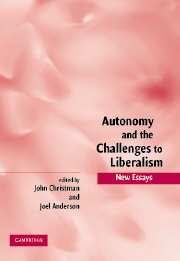Book contents
- Frontmatter
- Contents
- Contributors
- Preface
- Autonomy and the Challenges to Liberalism
- 1 Introduction
- PART I THE SELF: CONCEPTIONS OF THE AUTONOMOUS SELF
- PART II THE INTERPERSONAL: PERSONAL AUTHORITY AND INTERPERSONAL RECOGNITION
- PART III THE SOCIAL: PUBLIC POLICY AND LIBERAL PRINCIPLES
- PART IV THE POLITICAL: LIBERALISM, LEGITIMACY, AND PUBLIC REASON
- 11 Liberalism without Agreement: Political Autonomy and Agonistic Citizenship
- 12 The Place of Autonomy within Liberalism
- 13 Moral Autonomy and Personal Autonomy
- 14 Autonomy, Self-Knowledge, and Liberal Legitimacy
- Bibliography
- Index
12 - The Place of Autonomy within Liberalism
Published online by Cambridge University Press: 02 December 2009
- Frontmatter
- Contents
- Contributors
- Preface
- Autonomy and the Challenges to Liberalism
- 1 Introduction
- PART I THE SELF: CONCEPTIONS OF THE AUTONOMOUS SELF
- PART II THE INTERPERSONAL: PERSONAL AUTHORITY AND INTERPERSONAL RECOGNITION
- PART III THE SOCIAL: PUBLIC POLICY AND LIBERAL PRINCIPLES
- PART IV THE POLITICAL: LIBERALISM, LEGITIMACY, AND PUBLIC REASON
- 11 Liberalism without Agreement: Political Autonomy and Agonistic Citizenship
- 12 The Place of Autonomy within Liberalism
- 13 Moral Autonomy and Personal Autonomy
- 14 Autonomy, Self-Knowledge, and Liberal Legitimacy
- Bibliography
- Index
Summary
Introduction
My concern in this chapter is the place of autonomy within liberalism, understood as a public morality. To what extent is liberal morality necessarily committed to some doctrine of autonomy, and what is the nature of this doctrine? I begin (Section II) by briefly explicating my understanding of liberalism, which is based on the fundamental liberal principle – that all interferences with action stand in need of justification. Section III then defends my first core claim: given a certain compelling view of the nature of moral reasons, the fundamental liberal principle presupposes a Kantian conception of morally autonomous agents. I then consider (Section IV) an implication of the fundamental liberal principle when applied to public morality and the law – that an interference with liberty must be justified to everyone. This public justification principle, I argue, constitutes a version of Kant's categorical imperative; thus liberalism is committed to not only autonomy of the will (Section III) but a substantive morality of autonomy. By the end of Section IV, I will have shown that liberal morality is committed to what may be broadly deemed a “Kantian” conception of moral autonomy.
In Section V, I show how this necessary presupposition of moral autonomy in liberal public morality implies a further commitment to one interpretation of the much-discussed ideal of “personal autonomy.
- Type
- Chapter
- Information
- Autonomy and the Challenges to LiberalismNew Essays, pp. 272 - 306Publisher: Cambridge University PressPrint publication year: 2005
- 16
- Cited by

